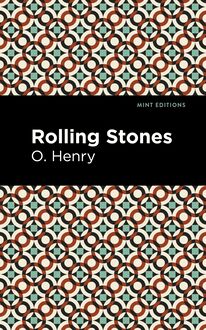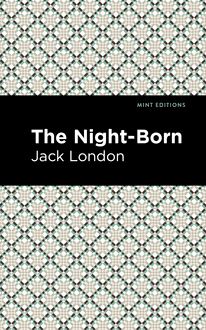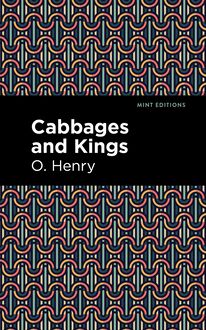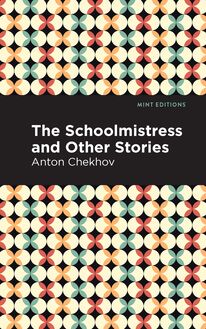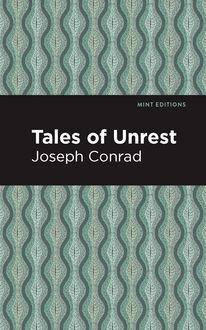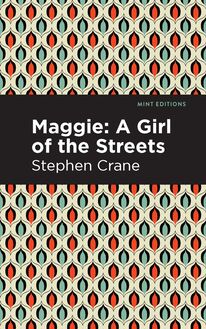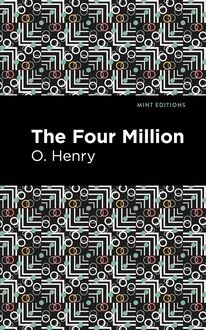-
 Univers
Univers
-
 Ebooks
Ebooks
-
 Livres audio
Livres audio
-
 Presse
Presse
-
 Podcasts
Podcasts
-
 BD
BD
-
 Documents
Documents
-
- Cours
- Révisions
- Ressources pédagogiques
- Sciences de l’éducation
- Manuels scolaires
- Langues
- Travaux de classe
- Annales de BEP
- Etudes supérieures
- Maternelle et primaire
- Fiches de lecture
- Orientation scolaire
- Méthodologie
- Corrigés de devoir
- Annales d’examens et concours
- Annales du bac
- Annales du brevet
- Rapports de stage
La lecture à portée de main
Vous pourrez modifier la taille du texte de cet ouvrage
Découvre YouScribe en t'inscrivant gratuitement
Je m'inscrisDécouvre YouScribe en t'inscrivant gratuitement
Je m'inscrisEn savoir plus
Vous pourrez modifier la taille du texte de cet ouvrage
En savoir plus

Description
Maggie: A Girl of the Streets (1893) is a novel by American writer Stephen Crane. Self-published by Crane when the author was only 22 years old, Maggie: A Girl of the Streets has since been recognized as the first work of American literary Naturalism. Inspired by his experience as a working reporter in Manhattan, Crane sought to explore the effects of poverty, alcoholism, and abuse on a character whose determination and moral goodness are entirely ill-suited for survival.
The story begins with Jimmie Johnson, a young boy whose family lives in squalor in Manhattan’s Bowery neighborhood. When he tries to fight a gang of older boys, Jimmie is saved by his best friend Pete, only to go home to parents who—in a drunken rage—frighten and abuse their three young children. The deaths of their father and young brother Tommie place an enormous burden Jimmie, who works as a teamster to support himself and his alcoholic mother. Although Maggie finds work as a seamstress and begins a promising relationship with Jimmie’s childhood friend Pete, her life is derailed by her family’s resentment and by the hypocrisy of her community. Forced onto the streets, Maggie Johnson must do whatever she can to survive. Maggie: A Girl of the Streets is a gritty novel that takes a hard look at the lowest and darkest parts of American society in the age of industry. What it finds is a loss of morality and a need for not only assistance and education, but a complete reassessment of what it means to be human.
With a beautifully designed cover and professionally typeset manuscript, this edition of Stephen Crane’s Maggie: A Girl of the Streets is a classic of American literature reimagined for modern readers.
Sujets
Informations
| Publié par | Mint Editions |
| Date de parution | 05 janvier 2021 |
| Nombre de lectures | 0 |
| EAN13 | 9781513274539 |
| Langue | English |
| Poids de l'ouvrage | 1 Mo |
Informations légales : prix de location à la page 0,0300€. Cette information est donnée uniquement à titre indicatif conformément à la législation en vigueur.
Extrait
Maggie
A Girl of the Streets
Stephen Crane
Maggie: A Girl of the Streets was first published in 1893.
This edition published by Mint Editions 2021.
ISBN 9781513269535 | E-ISBN 9781513274539
Published by Mint Editions®
minteditionbooks.com
Publishing Director: Jennifer Newens
Design & Production: Rachel Lopez Metzger
Typesetting: Westchester Publishing Services
C ONTENTS I II III IV V VI VII VIII IX X XI XII XIII XIV XV XVI XVII XVIII XIX
I
A very little boy stood upon a heap of gravel for the honor of Rum Alley. He was throwing stones at howling urchins from Devil’s Row who were circling madly about the heap and pelting at him.
His infantile countenance was livid with fury. His small body was writhing in the delivery of great, crimson oaths.
“Run, Jimmie, run! Dey’ll get yehs,” screamed a retreating Rum Alley child.
“Naw,” responded Jimmie with a valiant roar, “dese micks can’t make me run.”
Howls of renewed wrath went up from Devil’s Row throats. Tattered gamins on the right made a furious assault on the gravel heap. On their small, convulsed faces there shone the grins of true assassins. As they charged, they threw stones and cursed in shrill chorus.
The little champion of Rum Alley stumbled precipitately down the other side. His coat had been torn to shreds in a scuffle, and his hat was gone. He had bruises on twenty parts of his body, and blood was dripping from a cut in his head. His wan features wore a look of a tiny, insane demon.
On the ground, children from Devil’s Row closed in on their antagonist. He crooked his left arm defensively about his head and fought with cursing fury. The little boys ran to and fro, dodging, hurling stones and swearing in barbaric trebles.
From a window of an apartment house that upreared its form from amid squat, ignorant stables, there leaned a curious woman. Some laborers, unloading a scow at a dock at the river, paused for a moment and regarded the fight. The engineer of a passive tugboat hung lazily to a railing and watched. Over on the Island, a worm of yellow convicts came from the shadow of a building and crawled slowly along the river’s bank.
A stone had smashed into Jimmie’s mouth. Blood was bubbling over his chin and down upon his ragged shirt. Tears made furrows on his dirt-stained cheeks. His thin legs had begun to tremble and turn weak, causing his small body to reel. His roaring curses of the first part of the fight had changed to a blasphemous chatter.
In the yells of the whirling mob of Devil’s Row children there were notes of joy like songs of triumphant savagery. The little boys seemed to leer gloatingly at the blood upon the other child’s face.
Down the avenue came boastfully sauntering a lad of sixteen years, although the chronic sneer of an ideal manhood already sat upon his lips. His hat was tipped with an air of challenge over his eye. Between his teeth, a cigar stump was tilted at the angle of defiance. He walked with a certain swing of the shoulders which appalled the timid. He glanced over into the vacant lot in which the little raving boys from Devil’s Row seethed about the shrieking and tearful child from Rum Alley.
“Gee!” he murmured with interest. “A scrap. Gee!”
He strode over to the cursing circle, swinging his shoulders in a manner which denoted that he held victory in his fists. He approached at the back of one of the most deeply engaged of the Devil’s Row children.
“Ah, what deh hell,” he said, and smote the deeply-engaged one on the back of the head. The little boy fell to the ground and gave a hoarse, tremendous howl. He scrambled to his feet, and perceiving, evidently, the size of his assailant, ran quickly off, shouting alarms. The entire Devil’s Row party followed him. They came to a stand a short distance away and yelled taunting oaths at the boy with the chronic sneer. The latter, momentarily, paid no attention to them.
“What deh hell, Jimmie?” he asked of the small champion.
Jimmie wiped his blood-wet features with his sleeve.
“Well, it was dis way, Pete, see! I was goin’ teh lick dat Riley kid and dey all pitched on me.”
Some Rum Alley children now came forward. The party stood for a moment exchanging vainglorious remarks with Devil’s Row. A few stones were thrown at long distances, and words of challenge passed between small warriors. Then the Rum Alley contingent turned slowly in the direction of their home street. They began to give, each to each, distorted versions of the fight. Causes of retreat in particular cases were magnified. Blows dealt in the fight were enlarged to catapultian power, and stones thrown were alleged to have hurtled with infinite accuracy. Valor grew strong again, and the little boys began to swear with great spirit.
“Ah, we blokies kin lick deh hull damn Row,” said a child, swaggering.
Little Jimmie was striving to stanch the flow of blood from his cut lips. Scowling, he turned upon the speaker.
“Ah, where deh hell was yeh when I was doin’ all deh fightin?” he demanded. “Youse kids makes me tired.”
“Ah, go ahn,” replied the other argumentatively.
Jimmie replied with heavy contempt. “Ah, youse can’t fight, Blue Billie! I kin lick yeh wid one han’.”
“Ah, go ahn,” replied Billie again.
“Ah,” said Jimmie threateningly.
“Ah,” said the other in the same tone.
They struck at each other, clinched, and rolled over on the cobble stones.
“Smash ’im, Jimmie, kick deh damn guts out of ’im,” yelled Pete, the lad with the chronic sneer, in tones of delight.
The small combatants pounded and kicked, scratched and tore. They began to weep and their curses struggled in their throats with sobs. The other little boys clasped their hands and wriggled their legs in excitement. They formed a bobbing circle about the pair.
A tiny spectator was suddenly agitated.
“Cheese it, Jimmie, cheese it! Here comes yer fader,” he yelled.
The circle of little boys instantly parted. They drew away and waited in ecstatic awe for that which was about to happen. The two little boys fighting in the modes of four thousand years ago, did not hear the warning.
Up the avenue there plodded slowly a man with sullen eyes. He was carrying a dinner pail and smoking an apple-wood pipe.
As he neared the spot where the little boys strove, he regarded them listlessly. But suddenly he roared an oath and advanced upon the rolling fighters.
“Here, you Jim, git up, now, while I belt yer life out, you damned disorderly brat.”
He began to kick into the chaotic mass on the ground. The boy Billie felt a heavy boot strike his head. He made a furious effort and disentangled himself from Jimmie. He tottered away, damning.
Jimmie arose painfully from the ground and confronting his father, began to curse him. His parent kicked him. “Come home, now,” he cried, “an’ stop yer jawin’, er I’ll lam the everlasting head off yehs.”
They departed. The man paced placidly along with the apple-wood emblem of serenity between his teeth. The boy followed a dozen feet in the rear. He swore luridly, for he felt that it was degradation for one who aimed to be some vague soldier, or a man of blood with a sort of sublime license, to be taken home by a father.
II
E ventually they entered into a dark region where, from a careening building, a dozen gruesome doorways gave up loads of babies to the street and the gutter. A wind of early autumn raised yellow dust from cobbles and swirled it against an hundred windows. Long streamers of garments fluttered from fire-escapes. In all unhandy places there were buckets, brooms, rags and bottles. In the street infants played or fought with other infants or sat stupidly in the way of vehicles. Formidable women, with uncombed hair and disordered dress, gossiped while leaning on railings, or screamed in frantic quarrels. Withered persons, in curious postures of submission to something, sat smoking pipes in obscure corners. A thousand odors of cooking food came forth to the street. The building quivered and creaked from the weight of humanity stamping about in its bowels.
A small ragged girl dragged a red, bawling infant along the crowded ways. He was hanging back, baby-like, bracing his wrinkled, bare legs.
The little girl cried out: “Ah, Tommie, come ahn. Dere’s Jimmie and fader. Don’t be a-pullin’ me back.”
She jerked the baby’s arm impatiently. He fell on his face, roaring. With a second jerk she pulled him to his feet, and they went on. With the obstinacy of his order, he protested against being dragged in a chosen direction. He made heroic endeavors to keep on his legs, denounce his sister and consume a bit of orange peeling which he chewed between the times of his infantile orations.
As the sullen-eyed man, followed by the blood-covered boy, drew near, the little girl burst into reproachful cries. “Ah, Jimmie, youse bin fightin’ agin.”
The urchin swelled disdainfully.
“Ah, what deh hell, Mag. See?”
The little girl upbraided him, “Youse allus fightin’, Jimmie, an’ yeh knows it puts mudder out when yehs come home half dead, an’ it’s like we’ll all get a poundin’.”
She began to weep. The babe threw back his head and roared at his prospects.
“Ah, what deh hell!” cried Jimmie. “Shut up er I’ll smack yer mout’. See?”
As his sister continued her lamentations, he suddenly swore and struck her. The little girl reeled and, recovering herself, burst into tears and quaveringly cursed him. As she slowly retreated her brother advanced dealing her cuffs. The father heard and turned about.
“Stop that, Jim, d’yeh hear? Leave yer sister alone on the street. It’s like I can never beat any sense into yer damned wooden head.”
The urchin raised his voice in defiance to his parent and continued his attacks. The babe bawled tremendously, protesting with great violence. During his sister’s hasty manoeuvres, he was dragged by the arm.
Finally the procession plunged into one of the gruesome doorways. They crawled up dark stairways and along cold, gloomy halls. At last the father pushed open a door and
-
 Univers
Univers
-
 Ebooks
Ebooks
-
 Livres audio
Livres audio
-
 Presse
Presse
-
 Podcasts
Podcasts
-
 BD
BD
-
 Documents
Documents
-
Jeunesse
-
Littérature
-
Ressources professionnelles
-
Santé et bien-être
-
Savoirs
-
Education
-
Loisirs et hobbies
-
Art, musique et cinéma
-
Actualité et débat de société
-
Jeunesse
-
Littérature
-
Ressources professionnelles
-
Santé et bien-être
-
Savoirs
-
Education
-
Loisirs et hobbies
-
Art, musique et cinéma
-
Actualité et débat de société
-
Actualités
-
Lifestyle
-
Presse jeunesse
-
Presse professionnelle
-
Pratique
-
Presse sportive
-
Presse internationale
-
Culture & Médias
-
Action et Aventures
-
Science-fiction et Fantasy
-
Société
-
Jeunesse
-
Littérature
-
Ressources professionnelles
-
Santé et bien-être
-
Savoirs
-
Education
-
Loisirs et hobbies
-
Art, musique et cinéma
-
Actualité et débat de société
- Cours
- Révisions
- Ressources pédagogiques
- Sciences de l’éducation
- Manuels scolaires
- Langues
- Travaux de classe
- Annales de BEP
- Etudes supérieures
- Maternelle et primaire
- Fiches de lecture
- Orientation scolaire
- Méthodologie
- Corrigés de devoir
- Annales d’examens et concours
- Annales du bac
- Annales du brevet
- Rapports de stage




